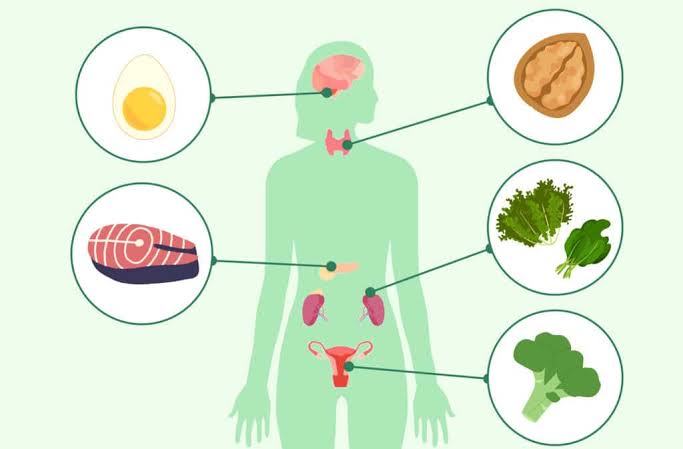
Balancing Hormones Naturally: Effective Lifestyle Tips to Manage PCOS and PCOD
Managing PCOS and PCOD naturally requires a balanced lifestyle with mindful habits. A nutritious diet, regular exercise, stress management, quality sleep, hydration, and natural remedies can restore hormonal balance. Weight control and avoiding processed foods are key to reducing symptoms. Yoga and meditation further enhance physical and emotional well-being.
💪 Fitness Guru
38 min read · 10, Sep 2025

Introduction
Polycystic Ovary Syndrome (PCOS) and Polycystic Ovary Disorder (PCOD) are among the most common hormonal imbalances affecting women today. From irregular periods, acne, and hair growth to weight gain, mood swings, and fertility struggles—these conditions can deeply impact daily life.
While medication is often prescribed, many women find that lifestyle changes play the biggest role in managing symptoms and balancing hormones naturally. Nutrition, exercise, stress management, and mindful habits can all help regulate cycles, improve metabolism, and restore overall health.
In this article, we’ll explore effective natural tips to balance hormones, the science behind them, and practical ways to manage PCOS and PCOD in everyday life. Polycystic Ovary Syndrome (PCOS) and Polycystic Ovary Disorder (PCOD) are among the most common hormonal imbalances that affect women today. They occur when the ovaries produce higher-than-normal levels of androgens, the male hormones, which leads to problems such as irregular periods, weight gain, acne, excessive hair growth, thinning scalp hair, and in some cases, difficulty in conceiving. While the terms PCOS and PCOD are often used interchangeably, they are slightly different in medical terms, yet both reflect hormonal disturbances that can disrupt a woman’s health and lifestyle. Modern medicine provides treatments to manage the symptoms, but many women are increasingly looking for natural ways to restore balance and improve their overall well-being. Managing PCOS and PCOD through lifestyle changes is not only possible but also highly effective when followed consistently with patience and self-care.
The first and most powerful natural tool in managing these conditions is nutrition. Food has a direct impact on hormones, and making the right dietary choices helps regulate insulin levels, reduce inflammation, and maintain a healthy weight. Women with PCOS and PCOD are often insulin resistant, meaning their bodies do not use insulin effectively, which leads to high blood sugar levels and can worsen the symptoms. A diet that focuses on whole, unprocessed foods such as fresh vegetables, fruits, lean proteins, healthy fats, legumes, and whole grains can make a tremendous difference. Reducing refined carbohydrates, sugary snacks, and processed foods helps to stabilize insulin levels. Incorporating foods rich in omega-3 fatty acids, such as flaxseeds, chia seeds, walnuts, and fatty fish, supports hormone regulation and reduces inflammation. Eating small, balanced meals throughout the day instead of skipping or overeating can also help stabilize blood sugar and energy levels.
Equally important is the role of physical activity in balancing hormones. Exercise is one of the most natural ways to enhance insulin sensitivity, reduce weight, and improve mood. A combination of cardio, strength training, and yoga has been found to be beneficial for women with PCOS and PCOD. Cardio exercises like brisk walking, cycling, and swimming help burn calories and reduce fat. Strength training helps build lean muscle mass, which increases the body’s ability to use glucose effectively. Yoga, on the other hand, not only improves flexibility and reduces stress but also supports hormonal balance by lowering cortisol levels, the stress hormone that often disrupts reproductive hormones. Even dedicating thirty minutes daily to physical activity can bring remarkable improvements over time.
Weight management is another crucial aspect. Even a small reduction of five to ten percent in body weight can help restore ovulation, regulate menstrual cycles, and improve fertility in women with PCOS and PCOD. It is not about extreme dieting or rapid weight loss but about gradual and sustainable changes that can be maintained in the long run. Consistency in following a balanced diet and exercise routine plays a significant role in achieving these results.
Stress management is often overlooked but has a huge impact on hormonal health. Chronic stress raises cortisol, which disrupts the delicate balance of reproductive hormones and worsens the symptoms of PCOS and PCOD. Natural ways to manage stress include practices like meditation, deep breathing exercises, journaling, spending time in nature, or pursuing hobbies that bring joy and relaxation. Mindfulness practices help women stay connected with their bodies, reduce anxiety, and create a sense of inner balance. Adequate sleep is equally important, as poor sleep disturbs hormonal cycles and insulin sensitivity. Maintaining a regular sleep schedule, avoiding screens before bedtime, and creating a calming nighttime routine can support restful and restorative sleep.
Another natural method of balancing hormones involves incorporating certain herbs and natural supplements, though they should be used with caution and preferably under professional guidance. For instance, spearmint tea is known to reduce androgen levels and improve symptoms like unwanted hair growth. Cinnamon may improve insulin sensitivity, while fenugreek seeds support better metabolism. Vitamin D deficiency is commonly observed in women with PCOS and PCOD, so ensuring adequate vitamin D through sunlight exposure or supplements can improve insulin and menstrual health. However, it is essential to consult a healthcare provider before starting any supplements to ensure they are safe and suitable for individual needs.
Detoxifying the body through hydration and mindful living also helps. Drinking plenty of water supports metabolism, flushes out toxins, and helps maintain overall health. Avoiding exposure to endocrine-disrupting chemicals found in plastics, pesticides, and certain beauty products also plays a part in maintaining hormonal balance. Switching to natural and organic alternatives where possible can reduce the body’s toxic burden.
Emotional well-being is as important as physical health when dealing with PCOS and PCOD. Many women experience feelings of frustration, low self-esteem, or anxiety due to symptoms like weight gain, acne, or hair-related issues. Accepting the body, practicing self-love, and seeking emotional support from friends, family, or support groups can ease the mental burden. Professional counseling can also be helpful for those struggling with the psychological effects of hormonal imbalances.
Consistency is the golden key. PCOS and PCOD are long-term conditions that require sustainable lifestyle changes rather than quick fixes. Progress might seem slow, but every small step, whether it is choosing healthier meals, staying active, or practicing self-care, adds up to significant improvements in the long run. The journey is about creating a balanced lifestyle that supports both physical and emotional well-being.
In conclusion, balancing hormones naturally to manage PCOS and PCOD involves a holistic approach that includes mindful nutrition, regular exercise, stress reduction, adequate sleep, herbal support, and emotional care. While these lifestyle tips may not cure the conditions entirely, they help restore balance, reduce symptoms, and improve quality of life. By focusing on long-term, consistent efforts and treating the body with patience and kindness, women can empower themselves to live healthier and more fulfilling lives despite hormonal challenges.
Understanding PCOS and PCOD
Before jumping into solutions, let’s clarify what these conditions mean:
- PCOD (Polycystic Ovary Disorder): A condition where ovaries release immature eggs that can form small cysts. It is more about irregular ovulation.
- PCOS (Polycystic Ovary Syndrome): A more severe metabolic and hormonal disorder with multiple symptoms, including high levels of male hormones (androgens), insulin resistance, and irregular cycles.
Common symptoms include:
- Irregular or absent periods
- Excess facial or body hair (hirsutism)
- Weight gain, especially around the belly
- Acne or oily skin
- Hair thinning on scalp
- Mood swings, anxiety, or depression
- Fertility challenges
The good news? With consistent lifestyle practices, many women successfully manage symptoms, improve hormonal balance, and live healthier lives.
The Role of Lifestyle in Hormonal Balance
Your hormones respond directly to your lifestyle. The way you eat, move, sleep, and handle stress impacts insulin, cortisol, estrogen, and progesterone—all of which are crucial in PCOS and PCOD.
Balanced lifestyle = Balanced hormones.
Imbalanced lifestyle = Worsening symptoms.
Let’s break down the pillars of natural management.
Nutrition for Hormonal Balance
Food is medicine when it comes to PCOS and PCOD. Eating the right nutrients can regulate blood sugar, reduce inflammation, and support ovary function.
- Eat Balanced Meals
- Combine protein, fiber, and healthy fats at every meal.
- Helps regulate blood sugar and prevents insulin spikes.
- Examples: Eggs with vegetables, lentils with brown rice, grilled paneer with salad.
- Add Anti-Inflammatory Foods
- Chronic inflammation worsens PCOS symptoms.
- Include turmeric, ginger, garlic, berries, and leafy greens.
- Choose Low-GI Carbs
- Replace refined carbs with whole grains like oats, quinoa, and brown rice.
- Keeps insulin stable and reduces cravings.
- Include Healthy Fats
- Omega-3 fatty acids support hormone balance.
- Sources: Flaxseeds, walnuts, avocado, olive oil, fatty fish.
- Iron and B Vitamins
- Deficiencies in B12, folate, and iron are common.
- Add lentils, spinach, eggs, and fortified cereals.
- Hydration Matters
- Drink 8–10 glasses of water daily to flush toxins and support metabolism.
Exercise for PCOS and PCOD
Movement is one of the best medicines for hormonal balance. Exercise improves insulin sensitivity, reduces belly fat, and regulates ovulation.
- Cardio (3–4 times per week)
- Brisk walking, cycling, or dancing improves circulation and metabolism.
- Strength Training (2–3 times per week)
- Builds muscle, which burns more glucose and balances insulin.
- Yoga & Pilates
- Reduces stress hormones (cortisol) and supports reproductive health.
- Daily Activity
- Small movements matter—take stairs, stretch, and avoid long sitting hours.
Stress Management for Hormonal Health
Stress is a silent hormone disruptor. High cortisol can worsen insulin resistance and irregular periods.
Ways to manage stress naturally:
- Practice deep breathing or meditation for 10 minutes daily.
- Spend time in nature or sunlight to boost mood.
- Journaling thoughts or gratitude can calm the mind.
- Engage in hobbies—painting, dancing, or reading.
Sleep and Rest
Poor sleep increases stress, weight gain, and insulin resistance. Aim for 7–8 hours of quality sleep.
Tips for better sleep:
- Sleep and wake up at the same time daily.
- Avoid late-night screen use.
- Sip herbal teas like chamomile or tulsi before bed.
- Keep your bedroom dark, cool, and quiet.
Daily Lifestyle Practices for PCOS & PCOD
Morning Routine
- Start with warm water + lemon or cinnamon water.
- 20 minutes of yoga or walk.
- Breakfast with protein + fiber (like oats, eggs, or smoothie).
Midday Boost
- Balanced lunch with whole grains, lentils, and veggies.
- 10-minute walk after meals.
- Hydration with herbal teas.
Evening Ritual
- 30 minutes of light exercise (yoga, gym, dance).
- Dinner with lean protein + vegetables.
- Avoid processed or fried foods.
Weekly Lifestyle Habits
- 2–3 strength training sessions for muscle health.
- 1–2 yoga or meditation sessions for stress relief.
- Plan and prep meals to avoid junk food cravings.
- Dedicate time for hobbies and relaxation.
- Schedule regular health checkups and track menstrual cycle.
Common Problems & Prevention Tips
Weight Gain and Belly Fat
Cause: Insulin resistance
Solution: Balanced diet, strength training, avoid sugary drinks.
Irregular Periods
Cause: Hormonal imbalance
Solution: Regular exercise, eat whole foods, manage stress.
Excess Hair Growth (Hirsutism)
Cause: High androgen levels
Solution: Anti-inflammatory diet, maintain healthy weight, consult doctor for supplements.
Acne and Oily Skin
Cause: Excess androgens
Solution: Reduce dairy and refined carbs, include zinc and vitamin A foods.
Mood Swings
Cause: Hormonal fluctuations
Solution: Meditation, journaling, omega-3 rich diet.
Myths About PCOS and PCOD: Busted!
“PCOS/PCOD means I can never get pregnant.”
→ False! With the right lifestyle and medical support, many women conceive successfully.
“You need to cut out all carbs.”
→ Not true. Whole grains and complex carbs are essential for energy and hormone balance.
“Only overweight women get PCOS.”
→ Wrong! Even lean women can have PCOS due to hormonal imbalance.
“Medication is the only solution.”
→ Lifestyle plays a bigger role in long-term management than pills alone.
“PCOS is rare.”
→ Not at all. 1 in 5 women in India faces PCOS/PCOD today.
Sample Daily Meal & Lifestyle Plan for PCOS/PCOD
Breakfast
Oats porridge with flaxseeds and berries
Green tea or warm lemon water
Mid-Morning Snack
Handful of almonds or walnuts
1 fruit (low-GI, like apple or guava)
Lunch
Brown rice or quinoa with dal, leafy greens, and salad
1 glass buttermilk
Evening Snack
Roasted chickpeas or boiled corn
Herbal tea
Dinner
Grilled tofu/paneer/fish with steamed vegetables
1 whole wheat roti or quinoa
Lifestyle Add-on
20–30 minutes evening walk or yoga
15 minutes journaling or meditation before sleep
Conclusion
Balancing hormones naturally is not about quick fixes—it’s about consistent, small lifestyle changes that support your body every day. Nutrition, exercise, stress management, and good sleep are the four pillars of healing PCOS and PCOD.
By focusing on whole foods, regular movement, and mindfulness, you can reduce symptoms, regulate cycles, and feel more in control of your body. Remember, progress takes time, but every small step brings you closer to balance.
Start today—with one healthy meal, one mindful breath, and one walk.
Your hormones will thank you tomorrow.
Q&A Section
Q1:- What are PCOS and PCOD, and how do they affect women’s health?
Ans :- PCOS (Polycystic Ovary Syndrome) and PCOD (Polycystic Ovarian Disease) are hormonal imbalances that cause irregular periods, acne, weight gain, hair issues, and fertility problems, affecting overall well-being.
Q2:- How does diet play a role in balancing hormones naturally?
Ans :- Eating a diet rich in whole grains, vegetables, fruits, lean proteins, and healthy fats helps stabilize insulin levels and reduce hormonal imbalances.
Q3:- Why is regular exercise important for managing PCOS and PCOD?
Ans :- Physical activity improves insulin sensitivity, aids weight management, reduces stress, and helps regulate menstrual cycles naturally.
Q4:- How does stress affect hormonal balance in PCOS and PCOD?
Ans :- Chronic stress increases cortisol levels, which disrupts insulin and reproductive hormones, worsening symptoms like irregular periods and acne.
Q5:- Can proper sleep improve hormone regulation in women with PCOS and PCOD?
Ans :- Yes, quality sleep balances cortisol and insulin, supports reproductive health, and prevents worsening of hormonal imbalance symptoms.
Q6:- What natural remedies or herbs can help manage PCOS and PCOD?
Ans :- Herbs like spearmint tea, cinnamon, fenugreek, and ashwagandha may regulate hormones, reduce insulin resistance, and improve menstrual regularity.
Q7:- How does hydration impact hormonal health in PCOS and PCOD?
Ans :- Drinking enough water supports metabolism, flushes toxins, balances digestion, and indirectly aids in maintaining hormonal stability.
Q8:- Why is maintaining a healthy weight crucial in managing PCOS and PCOD?
Ans :- Excess weight worsens insulin resistance and hormone imbalance; even small weight loss can restore regular cycles and reduce symptoms.
Q9:- What role does avoiding processed food and sugar play in hormonal balance?
Ans :- Cutting refined sugar and processed foods reduces insulin spikes, helps control weight, and supports balanced hormone production.
Q10:- Can yoga and meditation help in managing PCOS and PCOD naturally?
Ans :- Yes, yoga and meditation reduce stress, improve blood circulation, regulate periods, and promote hormonal balance holistically.
Similar Articles
Find more relatable content in similar Articles

5 Common Skincare Routine Mistakes That Damage Your Skin (A..
A good skincare routine keeps.. Read More

Military Fitness Secrets the Public Doesn’t Know...
“Discover the hidden methods b.. Read More

Survival Fitness – Training Your Body for Natural Disasters...
Survival fitness equips your b.. Read More

Circadian Rhythm Fitness – Matching Workouts with Your Inter..
“Discover how aligning your wo.. Read More
© 2024 Copyrights by rFitness. All Rights Reserved.